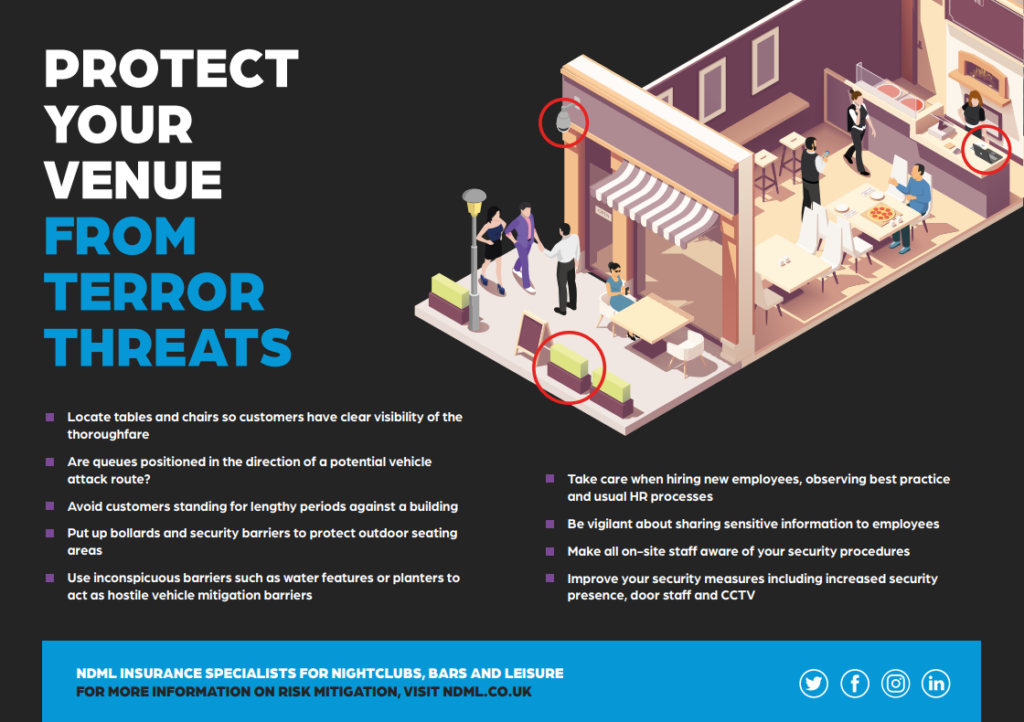Hospitality is returning
‘Al fresco’ drinking and dining will soon be on the rise. Thanks to the government’s road map out of lockdown, step 2 will allow the outdoor areas of hospitality venues to return to normal practice. Businesses within the hospitality industry will want to prioritise the preparation of these outdoor areas in the coming weeks.
For many this will require a pavement license. It’s easier to obtain pavement licences now, and many venues are able to use car parks and terrace spaces as part of their existing seating licenses. Certain events and outdoor activities such as fairs and outdoor markets no longer require a planning application, so it’s likely this type of event will rise as it’s far easier for people to organise them.
All this is great news for the industry and our economy. However, this means that ‘low tech’ attacks from terrorists could rise.
Eating and drinking outside could increase risk
Lone-wolf attackers using low tech methods such as weaponised motor vehicles are a unexpected risk to outdoor diners.
Using a motor vehicle as a weapon is easy to plan, organise and carry out. Unfortunately, that means it’s more likely that these types of attack will be more commonplace. Particularly given that large groups of people will be congregating outdoors from April 12th.
What can businesses do?
It’s always a business’s main goal to look after their customers and keep them safe. Restaurants and bars with an outdoor area must modify and upgrade their security procedures to minimise the chance of a terror attack.
There are some key ways businesses can help to keep customers safe from an outdoor terror attack:
- Try to keep tables and chairs away from roads used by traffic
- Position tables and chairs so customers are able to see up and down the thoroughfare
- Try to keep guests away from potential vehicle attack routes
Businesses should also download the ACT app to receive authoritative advice and ongoing updates should an attack happen in the local area. It also provides advice and guidance to help you protect your business and educate your team on how to respond in the event of a terror attack. Businesses can report an incident through the app and receive post-incident guidance too.
What is hostile vehicle mitigation?
Hostile Vehicle Mitigation aims to stop vehicle-based attacks. They protect spaces where your customers are likely to be.
For example, use bollards and security barriers or creative street furniture to ‘section off’ your outdoor seating area. The more barriers between a vehicle and those dining or drinking outside, the less likely it is that someone will target your establishment.
Keep your employees cyber-safe
Some employees may have access to sensitive information about your business operations. This includes insider knowledge on your premises layout and security codes/passwords.
No employee, either present or former, should use this information to damage your business. Unfortunately it can and does happen.
Be careful what information you share with employees. Ensure you operate effective exit controls when an employee leaves the company (either voluntarily or through redundancy or through a disciplinary process).
All staff on site should have a good awareness of your security policy, too, to make sure there are no lapses in your procedures.
Vet your employees and your suppliers
Any new employee or supplier brings with them increased risk. Adopt a stringent vetting process when hiring people or appointing suppliers. Both employees and suppliers should keep your business information safe. So it’s important to make sure you only confide in people you trust.
Alongside training all existing and new employees about COVID regulations, this can be done in tandem with cyber and terror educations. Teach them to look out for any unusual behaviour that could be linked to an impending terror attack.
Consider additional insurance
Terror attacks are unlikely. But will become more common as businesses begin to reopen. If your business is the victim of an attack, the consequences could be catastrophic. Terrorism insurance will protect your business financially if a terror attack impacts you. Whilst, of course, the safety of your team and your customers should always be top of your priority list – your business’s longevity should also be considered. If you had to use your own financial reserves to recover from an attack, how long could your business survive? Having comprehensive insurance cover in place will help to provide invaluable peace of mind.
For more information about leisure and hospitality trends post COVID-19, download our reopening handbook.
